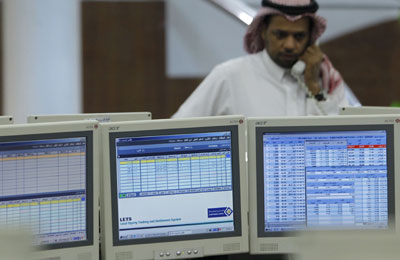
Sliding oil brings Gulf stock values to reasonable levels
DUBAI, January 18, 2015
By Olzhas Auyezov
When Saudi Arabia announced last July that it would open its stock market to direct foreign investment, a common worry among fund managers was that when the reform finally took place, the market would simply be too expensive to buy.
Sky-high valuations were a feature of Gulf Arab bourses for most of last year as the region basked in huge oil revenues, rapid economic growth and rock-bottom interest rates. They created dangerous bubbles in stocks and limited the scope for foreign fund managers to invest.
Now those valuations have been slashed by plunging stock prices as investors react to the collapse of oil prices. This has made the bourses look a lot more attractive from a fundamental perspective, many fund managers and analysts argue.
Until oil prices find a floor, investors will remain jittery, and the region may have to get used to somewhat slower growth in an era of cheap oil. But with governments promising to use their massive fiscal reserves to continue spending heavily, growth will not fall through the floor.
So excluding the petrochemical sector, where margins are being directly damaged by cheaper oil, corporate earnings growth in many industries of the six-nation Gulf Cooperation Council is expected to be solid this year.
"You should look at this as a shopping season for undervalued stocks," said Amr Hussein Elalfy, global head of research at regional brokerage Mubasher Financial Services.
The stock indexes of Saudi Arabia, Dubai and Qatar traded at large premiums to developed market indexes such as the FTSEurofirst 300 and Dow Jones Industrial Average at the end of September in terms of prices to projected 2015 earnings, Thomson Reuters data shows.
Now Saudi Arabia is at 12.6 times expected earnings, Dubai at 11.2 and Qatar at 12.5, while the FTSEurofirst 300 and Dow are valued at 13.8 and 15.5 times respectively.
"The GCC markets are trading at a discount to the developed markets with generous dividend yields that are among the highest in the world," Tarek Fadlallah, chief executive of Nomura Asset Management Middle East, noted in a report last week.
TRANSPORT, LOGISTICS
The transport and logistics sector is one beneficiary of lower international fuel prices. Since September 30, analysts surveyed by Reuters have raised their average forecast for low-cost carrier Air Arabia's net profit by 37.2 per cent, while its shares have gained 21.2 per cent.
Air Arabia's forward price-to-earnings ratio is 8.8 times compared with 28.7 for Malaysia's AirAsia and 19.1 for Bangkok Airways, according to Reuters data.
Global logistics firms such as Dubai's Aramex and Kuwait's Agility could also benefit. Analysts have raised their outlook for Agility's 2015 earnings by 15.6 per cent, though forecasts for Aramex are so far unchanged.
Because domestic fuel prices in the Gulf are already rock-bottom and heavily subsidised, other sectors won't benefit from cheap oil in the same way that they would in most countries.
But food and retailing firms are widely seen as safe in an era of cheap oil because they depend largely on the Gulf's robust population growth, which will continue regardless of governments' oil revenues.
Average 2015 profit forecasts for Saudi food makers Savola and Almarai have been trimmed by just 0.7 and 4.0 per cent since September.
Savola's forward price-to-earnings ratio of 17.4 times is lower than global giants such as Nestle, at 20.3, and Danone, at 19.2, and emerging market peers like Indonesia's Indofood, at 24.2. Almarai, however, trades at a higher multiple of 22.2.
Earnings expectations for GCC banks have remained largely intact during oil's plunge, with the exception of Saudi Arabia's retail-focused lenders such as Al Rajhi Bank - their profits are likely to suffer because of Saudi rules limiting consumer finance fees introduced last September.
"The regional banking sector is at some risk from deteriorating asset quality but compares well with its peer group and can be considered attractive given its strong capitalisation and robust regulatory regime," Fadlallah said.
Banks which are leaders in their countries command a premium: Saudi Arabia's National Commercial Bank and Qatar National Bank trade at 13.6 and 12.5 times forward earnings respectively.
Their smaller competitors are cheaper. Samba Financial and Banque Saudi Fransi, the fourth- and fifth-largest Saudi banks by assets, trade at 9.9 and 10.5 times, roughly on par with global player HSBC.
RISKS
The most risky stocks in the Gulf may be those in sectors likely to face higher taxes and fees if governments respond to cheap oil by raising revenues from other sources.
Oman and Bahrain, the financially weakest of the GCC states, are already taking such action. Omani cement firms and other industrial companies said last month that their government was doubling the price of natural gas supplied to them, and would make further hikes in subsequent years.
Bahrain said last week it would raise prices of natural gas for industry on April 1, affecting users such as Aluminium Bahrain. The government did not reveal the size of the hike.
In the petrochemicals sector, though valuations have already plummeted, analysts remain reluctant to recommend stocks as long as oil remains volatile.
Saudi Arabia's NCB Capital said its top pick in the sector was National Industrialization Co (Tasnee), which gets half its profit from a non-petrochemical product, titanium dioxide.
At 11.9 times earnings, Tasnee trades at a premium to petrochemicals giant Saudi Basic Industries, at 10.2, but is much cheaper than pure miner Ma'aden, at 21.1. - Reuters







